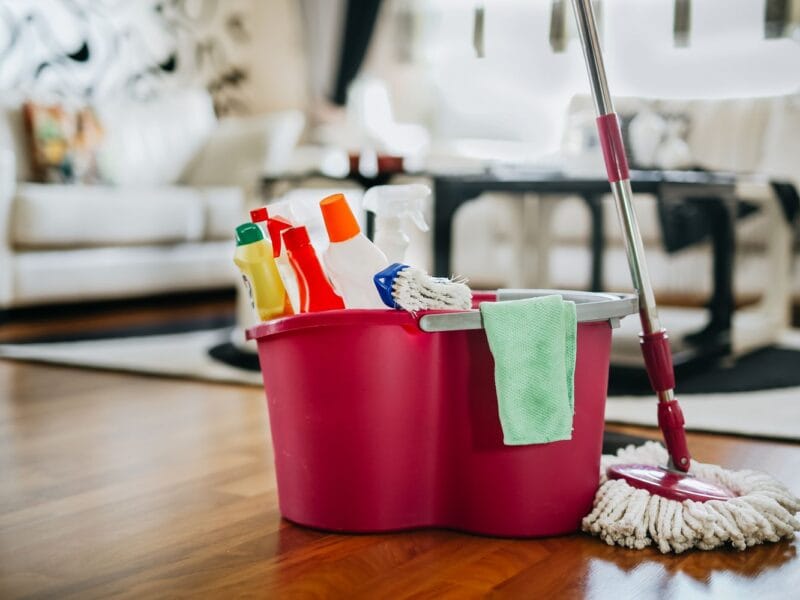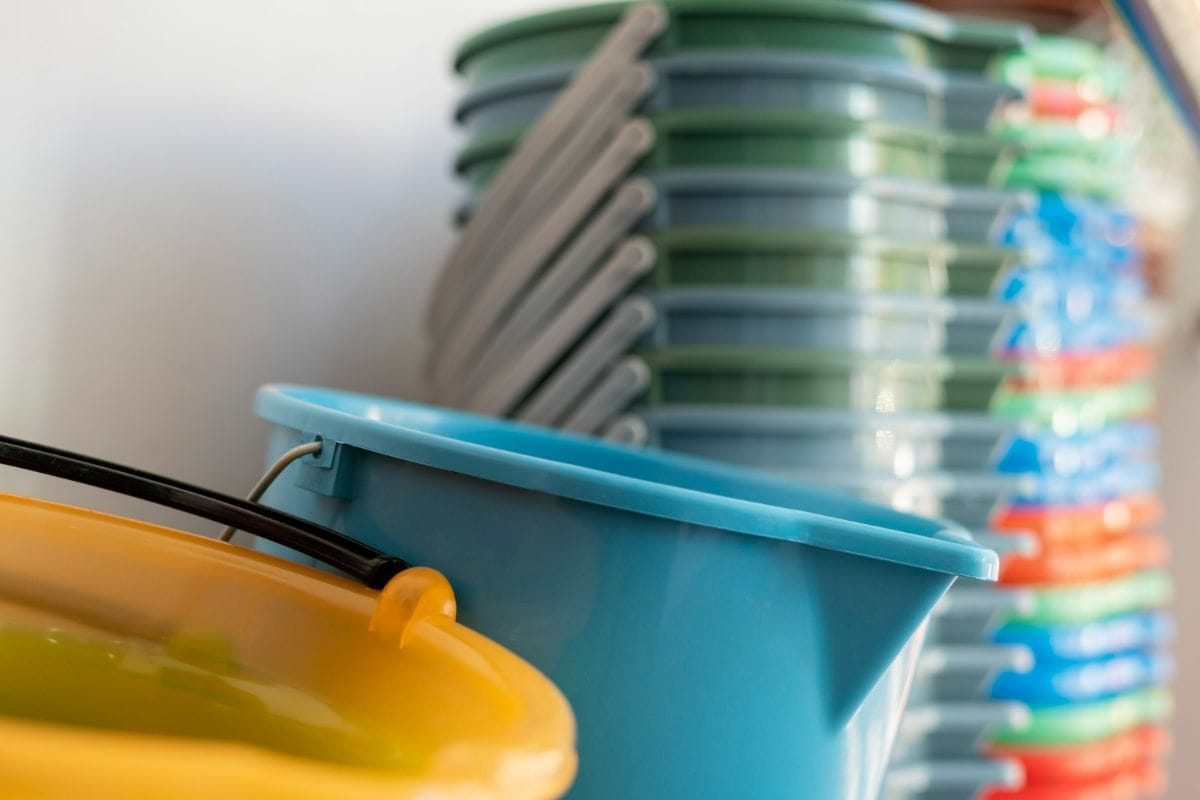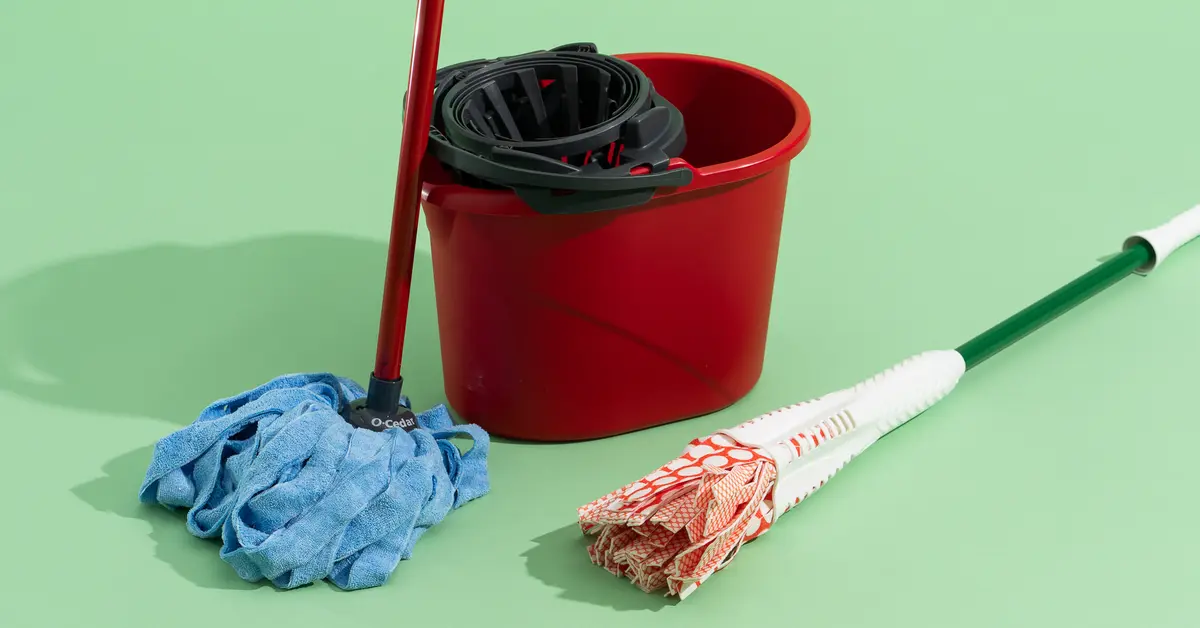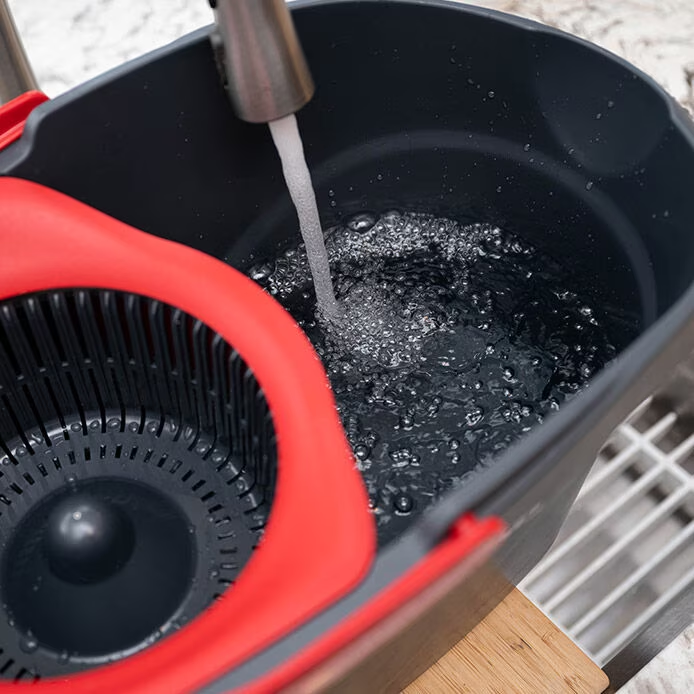
重要な清掃用具として、モップバケツは世界中の家庭、商業、工業用清掃の強力な助っ人となっている。清掃作業を簡素化するだけでなく、清掃効率も大幅に向上する。モップバケツは絶妙に設計され、操作が簡単で、ユーザーが床を清潔で衛生的に保つのに効果的です。
家庭の日常清掃でも、商業・工業環境でも、モップバケツはかけがえのない役割を果たしている。こうした利点があるからこそ、モップバケツは世界中の市場で売れ筋となり、清掃用品のスター商品となっているのだ。ここでは、モップバケツの使用シーン、素材選び、特徴、メンテナンスのポイントなどをご紹介しよう。
モップバケツの利用シーン
モップバケツは、その汎用性と効率性から様々な場所で広く使用されており、あらゆる場所で清掃作業に欠かせない助っ人となっている。どのような環境でも、モップバケツは信頼性の高い清掃ソリューションを提供し、ユーザーが様々な清掃の課題に簡単に対処できるようにします。
ホームクリーニング
家庭環境において、モップバケツは毎日の床掃除のための重要な道具である。キッチン、バスルーム、リビングルームなどの床掃除は、モップバケツで行うことができる。家庭用のモップバケツは通常、軽量で操作が簡単なように設計されている。地面の汚れや水垢を素早く取り除くことができ、家庭環境を清潔で衛生的に保つことができる。
商業およびオフィス環境
商業施設やオフィス環境において、モップバケツは公共エリアを清潔に保つための大きな助っ人です。オフィス、会議室、廊下、トイレなどでは定期的な清掃が必要ですが、モップバケツならこれらの作業を効率的に行うことができます。業務用モップバケツは一般的に容量が大きく、キャスターやハンドルが付いているため、清掃スタッフの移動や使用に便利で、作業効率が向上します。
工業用地
工場や倉庫などの工業用地では、通常、より広い面積とより重い清掃が要求されます。工業用モップバケツは通常、耐久性のある素材で作られており、頻繁で広い面積の清掃作業に対応できるよう頑丈に設計されています。これらのモップバケツは容量が大きく、より多くの洗剤と水を入れることができるため、汚染が激しく頻度の高い環境での使用に適しています。
モップバケツの一般的な材質
モップバケツには様々な素材があり、主に使用シーン、耐久性、携帯性、コストなどを考慮して選択される。以下に一般的なモップバケツの素材とその特徴を紹介する:
PP(ポリプロピレン)
特徴 PP(ポリプロピレン)素材は、耐熱性、耐食性、耐薬品性に優れ、機械的強度が高い、広く使用されているプラスチック素材です。変形しにくく、ある程度の圧力にも耐え、洗浄も簡単です。
アプリケーション PP製のモップバケツは丈夫で耐久性があり、家庭、オフィス、ホテルなどでの使用に適しています。大容量で丈夫な構造なので、毎日の掃除のニーズに応えます。
PVC(ポリ塩化ビニル)
特徴PVC(ポリ塩化ビニル)素材は、耐水性、耐酸性、耐アルカリ性、絶縁性に優れた一般的なプラスチック素材でもある。PP素材に比べ、PVC素材は一般的に軽量ですが、耐久性が若干劣る場合があります。
用途PVCモップバケツは軽くて持ち運びしやすく、頻繁な移動や運搬が必要な場面に適しています。ただし、使用中に割れたり変形したりしないよう、品質や厚みに注意して選ぶ必要がある。

LEBOプラスチック PPモップバケツは耐久性、耐薬品性、持ち運びやすさ、清掃のしやすさ、コストパフォーマンスに優れている。これらの特徴により、PPモップバケツは消費者に人気があります。さらに、PP材料は環境保護の要求と経済的な配慮を満たしています。これらの特徴により、PPモップバケツは市場で幅広い用途の見通しと消費者の認知を得ている。
モップバケツの機能
貯水と供給
モップバケツの最も基本的な機能は、洗浄水を貯めておき、モップ作業時に適量の水分をモップに供給することである。この機能により、頻繁な水交換の手間を大幅に軽減し、清掃効率を向上させることができる。
モップ 洗濯と乾燥
最近のモップバケツの多くは、洗浄機能と回転機能を備えている。バケツの中でモップの予備洗浄を行い、表面の汚れや残留物を取り除くことができる。その後、スピンドライ機能を使ってモップから余分な水分を素早く取り除き、モップを適切な湿度に保つことで、液だれや過乾燥を防ぎ、より良い清掃結果を得ることができる。
濾過と分離
一部の高級モップバケツには、ろ過・分離機能も付いている。清掃中に汚水や不純物を分離し、きれいな水の透明度を保つ。これにより、きれいな水の使用時間を延ばすだけでなく、不純物による地面の二次汚染を効果的に防ぐことができる。
省力設計
使い勝手を向上させるため、多くのモップバケツは人間工学に基づいた省力化設計を採用している。例えば、移動が容易なローラー、さまざまな高さに適応する伸縮ポール、手の疲労を軽減する人間工学に基づいたハンドルなどが装備されている。これらの設計により、床掃除がより簡単になり、労力も軽減される。
節水
環境保護への意識が高まるにつれ、節水と環境保護を重視するモップバケツが増え始めている。水量を正確にコントロールし、きれいな水をリサイクルすることで、水の無駄を減らしている。同時に、モップバケツの製造には、環境への影響を減らすために、分解可能な素材やリサイクルしやすい素材も使用されている。
多機能統合
モップバケツの中には、基本的な清掃機能だけでなく、その他の実用的な機能を統合したものもある。例えば、消毒液や洗剤の容器、バキューム機能やダニ除去機能などが装備されている。このような多機能一体型のデザインにより、モップバケツは清掃プロセスにおいてより大きな役割を果たすことができ、ユーザーの多様なニーズに応えることができる。
美学と装飾
美観はモップバケツの主な機能ではないが、現代の家庭は家庭用品の外観に対する要求がますます高くなっている。そのため、多くのモップ用バケツは、家庭のスタイルに溶け込み、美観を向上させるようデザインされている。スタイリッシュな外観、色、素材のものがあり、家の装飾の一部となっている。
掃除の重要な道具であるモップバケツは、貯水、洗浄、乾燥といった基本的な機能を持つだけでなく、より知的で人道的、そして環境に優しい方向へと発展し続けている。

モップバケツのメンテナンス
モップ用バケツのお手入れとメンテナンスは、長期間効果的に使用し、耐用年数を延ばすための重要なポイントです。
クリーン・イン・タイム
モップバケツ内の汚水や不純物は、長期保管による細菌の繁殖や臭いの発生を避けるため、使用後すぐに流し出すこと。
モップバケツの内側と外側を中性洗剤と水で定期的に清掃し、汚れや残留物を取り除きます。強酸やアルカリなどの腐食性の洗浄剤は、バレルを傷めないように注意してください。
乾燥させて保管する
洗浄後は、風通しの良い涼しい場所で自然乾燥させ、直射日光や高温での焼成を避け、プラスチックの変形や老化を防ぐ。
保管する際は、カビや腐食の原因となる水分の蓄積を避けるため、モップ用バケツが乾いた状態であることを確認してください。
強い圧力と衝撃を避ける
使用中および保管中は、バケツのひび割れや変形を避けるため、モップ用バケツに過度の圧力や激しい衝撃を与えないでください。
点検・整備
フィルターやハンドルなど、モップ用バケツの部品に異常がないか定期的にチェックする。破損があれば、適時交換してください。
モップ用バケツの密閉性に注意すること。水漏れがあれば、すぐに対処すること。
正しい使い方
モップバケツを使用する際は、不適切な使用による損傷を避けるため、取扱説明書の指示に従って正しく操作してください。モップバケツの不必要な損傷を避けるため、清掃以外の目的には使用しないでください。
以上のようなお手入れとメンテナンスによって、モップ用バケツを良い状態に保ち、耐用年数を延ばし、家庭での掃除を容易にすることができる。

モップバケツに関するFAQ
モップバケツの使い方
モップバケツを使うには、まずモップバケツの半分まで水を入れ、適量のフロアクリーナーを加えます。モップヘッドを溶液に浸し、完全に飽和状態にした後、しぼり器を使って余分な水分を取り除き、モップが湿った状態を保ちますが、びしょ濡れにはなりません。必要に応じてバケツでモップをすすぎながら、8の字を描くように、または前後に動かしながら、部屋の隅からモップをかけ始める。水が汚くなったらバケツを空にして、きれいな水とクリーナーを補充し、モップがけを続ける。
モップバケツは何ガロン?
モップバケツの容量は様々ですが、ほとんどの標準的なモップバケツには5~10ガロンの水が入ります。バケツの正確な容量については、各モデルの仕様を確認してください。
なぜモップバケツに氷を入れるのか?
床をモップがけするとき、モップバケツに氷を入れると、掃除している場所を冷やすことができ、暑い環境では非常に効果的である。また、温水でのバクテリアの繁殖を防ぐ効果もある。
モップバケツに何を入れる?
モップバケツにきれいなぬるま湯を入れ、メーカーの説明書に従って適量のフロアクリーナーや消毒剤を加えます。床の種類や掃除の必要性に応じて、エッセンシャルオイルを数滴たらして香りを加えたり、少量の酢を加えて洗浄力を高めたりすることもできます。
モップバケツの組み立て方は?
まず、モップバケツの取っ手を取り付ける必要があるが、これは通常、パチンとはめるか、ねじって固定する。メーカーの説明書に従って、絞り器をスライドさせるか、クリップで固定します。使用する前に、すべての部品がしっかりと取り付けられ、バケツが安定していることを確認する。
モップバケツの掃除方法は?
掃除が終わったら、モップバケツの中の汚れた水を流し、きれいな水でモップバケツをすすいで、残ったゴミや洗剤かすを取り除きます。ブラシと中性洗剤を使って、モップバケツの角やしぼり具に特に注意しながら掃除する。バケツをよくすすいで石鹸を落とし、カビの繁殖を防ぐため、保管する前に完全に自然乾燥させます。
モップ用バケツのまとめ買いはどこで?
モップバケツは、様々なモップバケツメーカーやサプライヤーから大量に購入することができます。 LEBO は、あらゆる種類のプラスチック日用品を生産し、卸売するプロのプラスチック製品メーカーです。バルクで私たちのモップバケツは非常に高品質と競争力のある価格を持っています。多くのデザインスタイルとカスタマイズオプションで、あなたが必要とするモップバケツを大量に見つけることができます。スーパーマーケット、ブランドのカスタマイズ、または大量にモップバケツを購入するビジネスであるかどうか、私たちはあなたのニーズを満たすことができます。お見積もりは無料です。




